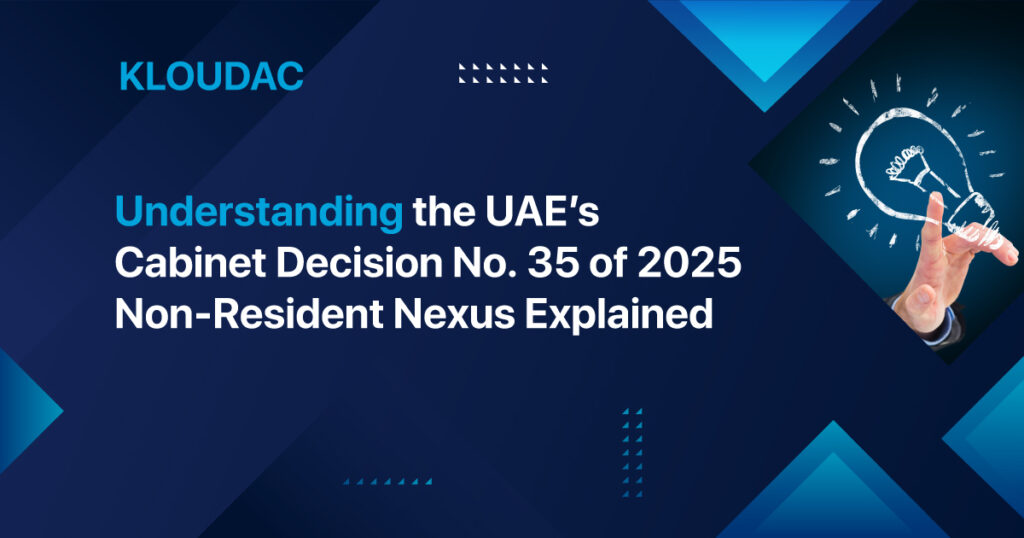The UAE continues to clarify its corporate tax landscape, and Cabinet Decision No. 35 of 2025 is a key development for foreign investors. This decision determines when a non-resident juridical person, a foreign company, or a fund has a taxable nexus in the UAE. For businesses and investors with UAE-based assets, understanding this rule is crucial for compliance and strategic planning.
What is a Non-Resident Nexus?
In simple terms, a nexus establishes a taxable connection between a non-resident entity and the UAE. If a foreign company or fund meets certain conditions, it must register for UAE corporate tax and comply with local tax obligations.
Cabinet Decision No. 35 of 2025 focuses on non-residents who:
- Derive income from UAE immovable property (real estate, land, buildings, or other property rights).
- Hold investments in Qualifying Investment Funds (QIFs) or similar entities that generate UAE property income.
- Engage in transactions or transfers that could be considered artificial or non-commercial.
Key Scenarios Where Nexus Arises
1. Income from UAE Immovable Property
Any foreign entity earning revenue from UAE real estate, through sale, rent, disposal, or direct use, automatically has a taxable nexus.
2. Adjustments under Cabinet Decision No. 34 of 2025
When the income of a non-resident is adjusted per CD 34, the nexus depends on the type of adjustment:
- Distribution of ≥80% of property income within nine months of the financial year-end triggers a nexus on the dividend distribution date.
- Failure to meet the 80% threshold creates a nexus on the date of acquisition of the ownership interest.
3. Artificial or Non-Commercial Transfers
Any transfer or disposal of UAE immovable property lacking a valid economic rationale is considered tax avoidance. A nexus arises for the non-resident, who may face additional scrutiny or penalties.
Mandatory Registration and Compliance
Once a nexus is established, the non-resident entity must register with the Federal Tax Authority (FTA). Failure to register or comply may lead to fines or other enforcement actions under the UAE Corporate Tax Law.
| Scenario | Nexus Arises? | Effective Date |
| Income from UAE immovable property | Yes | Upon earning income |
| Income adjustment per CD 34 Article 3(2) | Yes | Upon adjustment |
| Fund distributes ≥80% property income within 9 months | Yes | On the dividend distribution date |
| Fund distributes <80% property income | Yes | On the ownership acquisition date |
| Artificial or non-commercial property transfers | Yes (penalty risk) | Upon transfer |
Why This Matters for Investors
For foreign investors, especially in real estate or structured investment funds, CD 35 provides clarity on when UAE corporate tax obligations arise. The 80% distribution rule is particularly important for Qualifying Investment Funds, as it determines whether tax liability arises at acquisition or at distribution.
Understanding these rules ensures:
- Proper tax registration and reporting.
- Avoidance of penalties for non-compliance.
- Strategic investment planning within the UAE corporate tax regulations.
How UAE Corporate Tax and CD 35 Interact
- CD 35 aligns closely with Cabinet Decision No. 34 of 2025, which sets rules for fund adjustments and investment income recognition.
- CD 35 replaces Cabinet Decision No. 56 of 2023 for tax periods starting 1 January 2025, but older rules remain valid for prior periods.
- Non-resident investors should monitor both CD 34 and CD 35 to determine tax obligations accurately.
With KLOUDAC, Compliance Becomes Simple
Need guidance on navigating UAE corporate tax obligations for non-resident entities? KLOUDAC helps businesses understand nexus rules, register with the Federal Tax Authority, and stay fully compliant, ensuring your investments in the UAE are tax-ready and worry-free.
Cabinet Decision No. 35 of 2025 reinforces the UAE’s corporate tax framework by defining nexus triggers for non-residents. Foreign companies, real estate investors, and fund managers must understand these rules to remain compliant and make informed investment decisions. By clarifying when a taxable connection exists, the UAE ensures transparency while encouraging responsible foreign investment.
